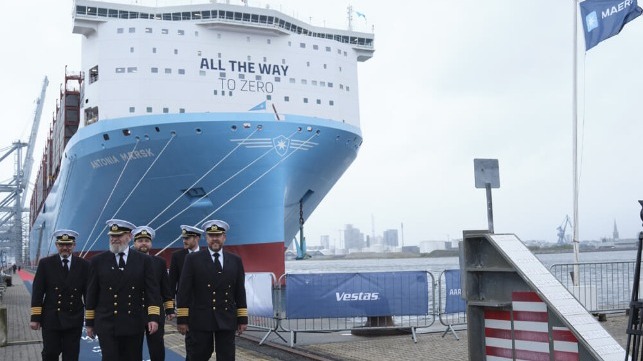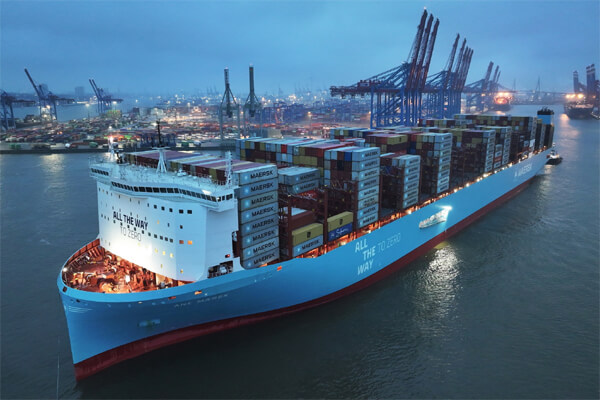Maersk Names Third Large Methanol Dual-Fuel Boxship in Denmark

Maersk celebrated the naming of the third vessel in its fleet of 18 large dual-fuel methanol containerships as the company continues the rollout of the revolutionary ships while also looking to the future. The naming of the fourth ship comes in just a matter of weeks while the company this week laid out plans for its fleet modernization focusing on the transition to new, greener ships.
“We are excited to introduce Antonia Maersk, the third large dual-fuel vessel in our fleet capable of sailing on green methanol,” the company wrote online. “The name was unveiled today at a ceremony held in Aarhus, Denmark. Antonia Maersk was christened by its godmother Kirsten Andersen, spouse of Vestas CEO Henrik Andersen.” Vestas is the Danish wind turbine company.
Consistent with the tradition of naming Maersk vessels after members of the founding family, Antonia Maersk is named after Antonia Uggla, granddaughter of Ane Maersk Mc-Kinney Uggla, the chair of A.P. Møller Foundation and its investment company A.P. Moller Holding, the majority owner of A.P. Moller - Maersk.
The Antonia Maesk is one of 18 large methanol-enabled newbuilds scheduled for delivery between 2024 and 2025. The first ship of the revolutionary class, Ane Maersk, was christened in January 2024 in South Korea and the second vessel Astrid Maersk was named in April in Yokohama, Japan. Keeping with the effort to show off the vessels and highlight the leadership in new technology, the fourth vessel will be named in a ceremony in late August at the Port of Los Angeles with co-sponsor Nike.
The ships incorporate new designs including moving the deckhouse and accommodations to the bow and offsetting the funnel to one side on the stern. The ships, which are 174,000 dwt, have 10 holds and a total loading capacity of just over 16,500 TEU. Both the main engines from MAN and the auxiliary engines are dual-fuel capable of running fully on methanol. Maersk reports when operating with methanol, the ship saves up to approximately 280 tonnes of CO2 per day compared to a traditional sip running on diesel fuel.

Ane Maersk which entered service in January highlights the different configuration of the vessel (Maersk)
CEO Vincent Clerc used today’s ceremony to reiterate the company’s commitment to accelerating a reduction in carbon emissions while also repeating calls for broad cooperation. He highlighted the higher cost of green fuels, at a time when the company is experiencing overall higher operating costs due to the diversions away from the Red Sea, and the challenges of obtaining enough green methanol. He admitted they are still having to operate the new ships part time on traditional fuels including to navigate into ports.
"We cannot make this journey alone,” Clerc told today’s audience. “A price mechanism is needed that can close the gap between the prices of transport with green fuels and fossil fuels.” He repeated today a new position for Maersk admitting due to the challenges they believe several different fuels will be used by the industry.
Earlier in the week Maersk said it was nearing orders for 50 to 60 new vessels, all to be used as fleet replacements. They are targeting 800,000 TEU of capacity by 2030, expecting a pace of 180,000 TEU per year.
To ensure the long-term competitiveness of the fleet and its ability to deliver on the decarbonization goals, Maersk announced it revised its strategy electing a mix of methanol and liquified gas dual-fuel propulsion systems. The company said it has commenced the work of securing offtake agreements for liquified bio-methane (bio-LNG) to ensure that the new dual-fuel gas vessels provide greenhouse gas emissions reductions in this decade.
Near-term, however, Maersk will continue to highlight its methanol vessels. Five of the methanol vessels are now in service, including one smaller feeder ship, with a total of 18 of the large vessels ordered. In addition, last year Maersk ordered six mid-size (9,000 TEU) dual-fuel vessels to be built in China. The first conversion of a large, in-service containership to methanol also got underway in July in China.
